| Artist |
Robert Fripp; Brian Eno |
| Album Title: |
Evening Star |
| Album Cover: |
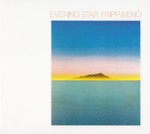 |
| Primary Genre |
Alternative & Punk: Avant Rock |
| Format |
CD |
| Released |
11/00/1975 |
| Reissue Date |
10/06/2008 |
| Label |
Discipline Global Mobile |
| Catalog No |
DGM0516 |
| Bar Code No |
6 33367 05162 2 |
| Reissue |
Yes |
| Remastered |
Yes |
| Packaging |
Digipack |
| Tracks |
| 1.
|
Wind on Water (5:29)
|
| 2.
|
Evening Star (7:50)
|
| 3.
|
Evensong (2:55)
|
| 4.
|
Wind on Wind (3:13)
|
| 5.
|
An Index of Metals I (4:15)
|
| 6.
|
An Index of Metals II (2:32)
|
| 7.
|
An Index of Metals III (3:51)
|
| 8.
|
An Index of Metals IV (6:30)
|
| 9.
|
An Index of Metals V (4:23)
|
| 10.
|
An Index of Metals VI (7:12)
|
|
| Date Acquired |
05/18/2010 |
| Personal Rating |
 |
| Acquired from |
Amazon |
| Purchase Price |
13.99 |
Web Links |
All Music Guide Entry:
Discogs Entry |
Notes |
Track 1 recorded live at The Olympia, Paris and at Olympic Studios, London.
Track 2 recorded at Island and Air Studios.
Track 3 recorded at Olympic Studios.
Tracks 4 to 10 recorded at Eno's Studio.
"Wind On Wind" is an excerpt from "<a href="http://www.discogs.com/Brian-Eno-Discreet-Music/master/6436">Discreet Music</a>"
Special thanks to Nick Bell and Malcolm le Grice.
All compositions published by BMG Music Ltd./Universal Music Ltd.
Originally released in November 1975. 24 bit remaster at Super Audio Mastering, Monks Withecombe, Devon, September 25-28, 2007.
The copyright in this sound recording and artwork is owned by Opal Ltd and Robert Fripp.
? 2008 Opal Ltd/Robert Fripp. © 2008 Opal Ltd/Robert Fripp.
www.dgmlive.com www.enoshop.co.uk
Sleeve: Printed in Canada
Disc: Made in the USA
foobar2000 1.3.6 / Dynamic Range Meter 1.1.1
log date: 2015-01-18 10:32:49
--------------------------------------------------------------------------------
Analyzed: Fripp & Eno / Evening Star
--------------------------------------------------------------------------------
DR Peak RMS Duration Track
--------------------------------------------------------------------------------
DR10 -0.83 dB -15.23 dB 5:29 01-Wind on Water
DR11 -0.15 dB -14.87 dB 7:51 02-Evening Star
DR10 -2.48 dB -17.62 dB 2:55 03-Evensong
DR9 -0.31 dB -14.60 dB 3:13 04-Wind on Wind
DR9 -8.82 dB -22.54 dB 4:16 05-An Index of Metals
DR9 -5.67 dB -17.76 dB 2:32 06-An Index of Metals
DR8 -2.49 dB -15.25 dB 3:51 07-An Index of Metals
DR8 -0.50 dB -11.57 dB 6:31 08-An Index of Metals
DR9 -0.08 dB -13.40 dB 4:23 09-An Index of Metals
DR7 -2.33 dB -14.43 dB 7:12 10-An Index of Metals
--------------------------------------------------------------------------------
Number of tracks: 10
Official DR value: DR9
Samplerate: 44100 Hz
Channels: 2
Bits per sample: 16
Bitrate: 754 kbps
Codec: FLAC
================================================================================
Issued as a standard Digipak.
The Inner Knot logo appears on the rear artwork (in the barcode rectangle bottom right), denoting US distributor. A 'Panegyric' logo in this position denotes <a href="http://www.discogs.com/release/1569927">UK version</a> distributor.
|
|
| Reviews |
All Music Guide Review:
Review by Ted Mills
Robert Fripp's second team up with Brian Eno was a less harsh, more varied affair, closer to Eno's then-developing idea of ambient music than what had come before in No Pussyfooting. The method used, once again, was the endless decaying tape loop system of Frippertronics but refined with pieces such as "Wind on Water" fading up into an already complex bed of layered synths and treated guitar over which Fripp plays long, languid solos. "Evening Star" is meditative and calm with gentle scales rocking to and fro while Fripp solos on top. "Wind on Wind" is Eno solo, an excerpt from the soon to be released Discreet Music album. The nearly 30-minute ending piece, "An Index of Metals," keeps Evening Star from being a purely background listen as the loops this time contain a series of guitar distortions layered to the nth degree, Frippertronics as pure dissonance. As a culmination of Fripp and Eno's experiments, Evening Star shows how far they could go.
Pitchfork Review:
Pitchfork - 8.6
Brian Eno, Roxy Music's art-schooled keyboard and tech wizard, and Robert Fripp, King Crimson's mostly self-taught guitarist, convened in Eno's home studio in 1972. Both were conceptually inclined: Eno called himself a "non-musician," while Fripp claimed to be tone deaf and rhythmically impaired when he began playing. Both of them would go on to reinvent their chosen tools-- Eno the studio, Fripp the guitar (he would eventually devise his own standard tuning and picking techniques)-- to suit their unique talents and visions. The two LP-length collaborations they recorded in the 70s, now remastered and reissued by DGM, laid the groundwork for each musician's most iconic works.
One technique is central to both records: the use of two Revox reel-to-reel tape recorders as a primitive looping system, wherein sounds recorded to the first deck resurfaced unpredictably when the tape passed through the second deck. Eno and Fripp didn't pioneer this technique; Terry Riley, among others, had used it before. But Eno would master it in his Ambient albums, where it became an end unto itself, not a background. As Eno refined the technique for the studio, Fripp refined it for the stage in his "Frippertronic" performances, which prefigured the use of looping pedals among arty rock bands today. Even in these two early works-- 1973's No Pussyfooting and 1975's Evening Star-- we can begin to track the process's rapid evolution.
On No Pussyfooting (the parentheses that originally enclosed the title are dropped on the reissue), we hear Eno and Fripp discovering the process-- it was the very first thing they recorded together in this vein. The album bursts with a sense of spontaneity. "The Heavenly Music Corporation" sequence is raw and rambunctious, resolving in long deep waves of aggression, with Fripp's molten, fluent guitar leads putting his rock prowess on display. The effervescent "Swastika Girls" strikes a contrast. In fact, "The Heavenly Music Corporation" and "Swastika Girls" seem designed as opposites-- the former gooey, deep, and broadly rolling, the latter effervescent, high, and cramped with wiry spirals. Of course, these tracks lack the sophistication of Eno's later ambient work, where pristine clarity became his focus. Clutter and impulsiveness haunt the margins, especially on "Swastika Girls", and Fripp's leads seem to stand somewhat apart from Eno's manipulations on "Heavenly". But whatever Pussyfooting lacks in subtlety, it compensates for with sheer mojo.
Evening Star demonstrates how quickly Eno and Fripp evolved-- it's confidently serene where No Pussyfooting was brashly assertive, and bears a closer resemblance to the 2004 Eno/Fripp collaboration The Equatorial Stars. Fripp's guitar is less often recognizable as such; we frequently hear what resembles clouds of bowed strings drifting through each other. When it is recognizable, as on the title track, the guitar phrases seem deeply interwoven with the surrounding sounds rather than roaring over them. The album opens with a quartet of naturalistically themed pieces, evoking water, wind, and sky, before delving down with a six-track sequence called "An Index of Metals". Not only did Eno and Fripp hone their technique on Evening Star, they erected a thematic architecture, which was absent from No Pussyfooting and would be crucial to Eno's subsequent work.
The only disappointing thing about these reissues is the bonus content. There's none on Evening Star, and No Pussyfooting comes with a second disc of reversed and half-speed mixes. There's an historical precedent for this: Miscuing a tape, John Peel played tracks from No Pussyfooting backwards on his radio show (and it says a lot about this kind of music that only Eno noticed the error), while the slowed-down versions recreate the experience of playing the album, which was originally released on vinyl, at the wrong speed. That's cool, but would have made more sense on a commercial release in 1975. Now that listeners who want to hear music at different speeds can create the effect themselves in a matter of seconds, the bonus disc seems anachronistic.
In his review of The Equatorial Stars, Dominique Leone correctly downplayed the idea that anything was invented on these albums. As previously mentioned, the technique that informed them predated Eno and Fripp. And while Eno made great strides in building a theory of ambient music, the basic challenge-- to make music that took an evasive stance toward form and content-- wasn't new; many modernist composers had already been approaching it in a variety of ways. But art always evolves that way, with old ideas recombining into new forms, embodied in but not created by specific individuals. Eno and Fripp invented something more tangible than an abstract cultural movement here: They invented themselves, and a way of thinking about music that was not so much novel as perfectly of the moment, alive to its unique technological and conceptual possibilities. They irrevocably altered the course of art music in the process.
— Brian Howe, January 9, 2009
|
|
| Cover 1 |
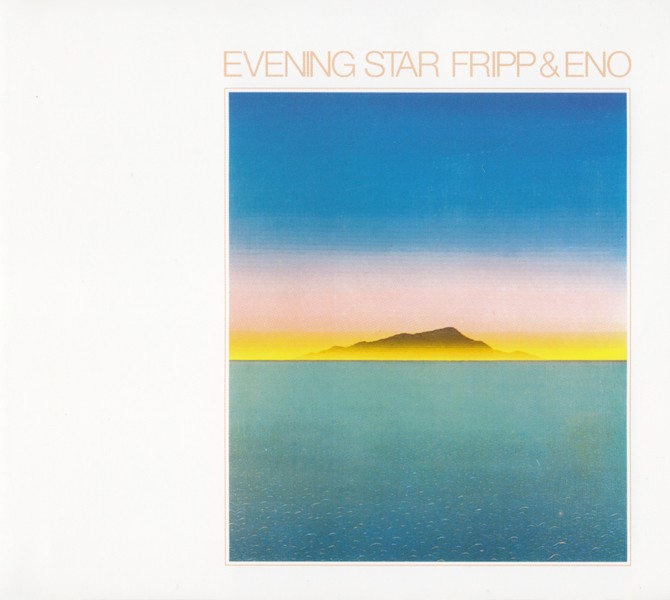 |
| Cover 2 |
 |
| Cover 3 |
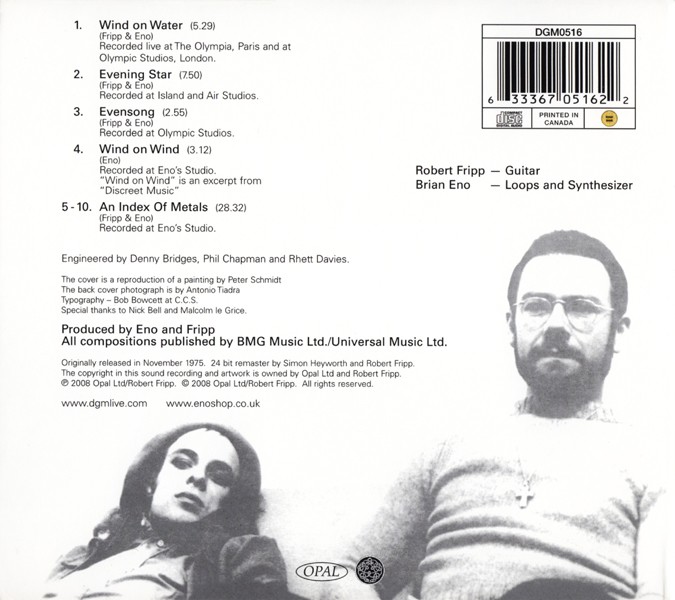 |
| Cover 4 |
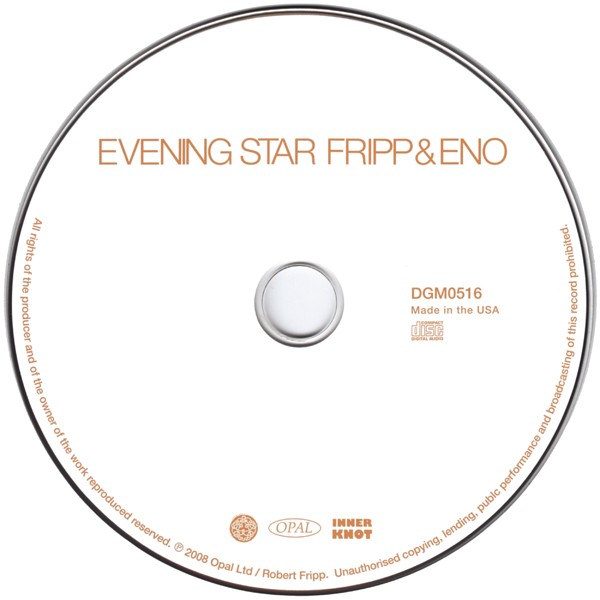 |
| Cover 5 |
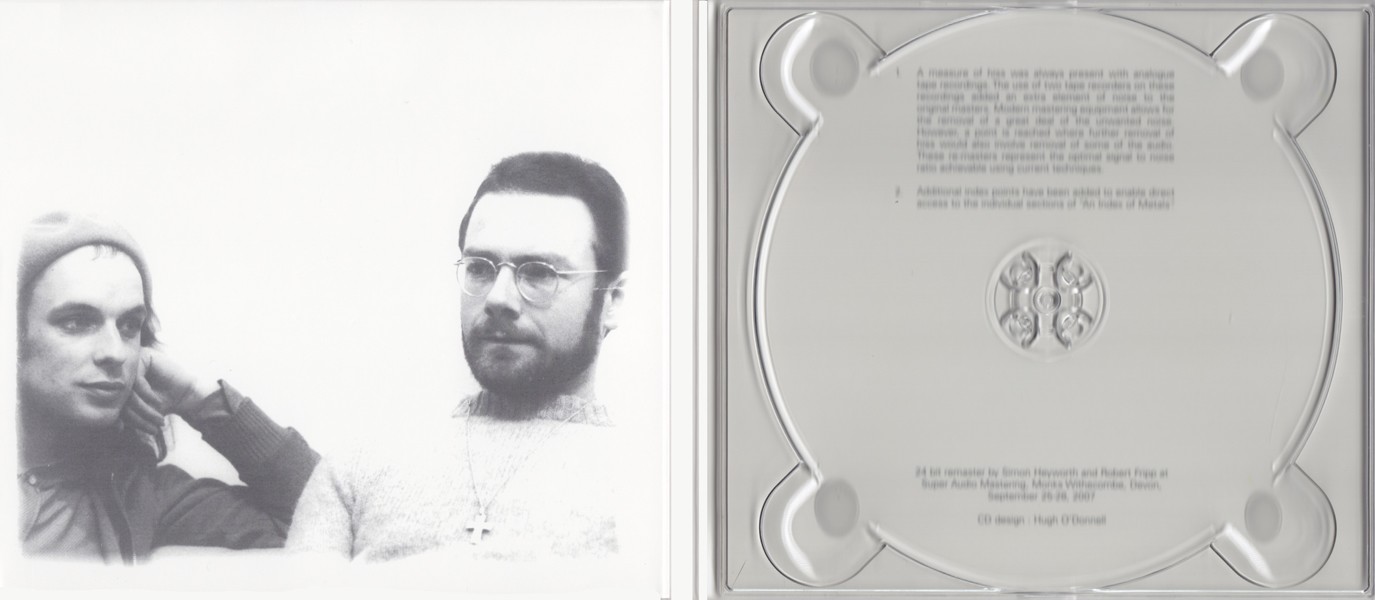 |
| Cover 6 |
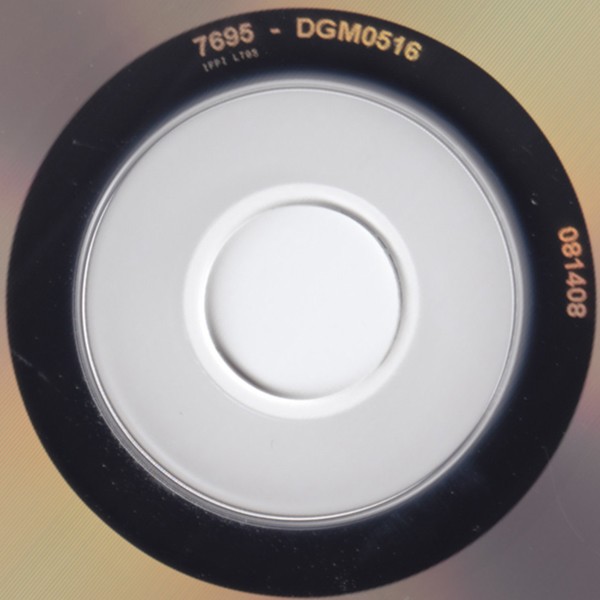 |
|








